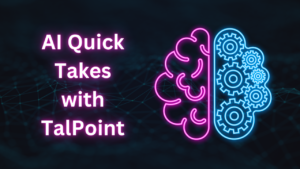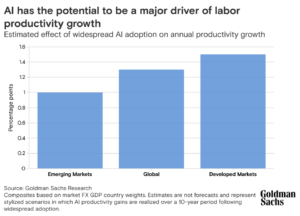Published: May 17, 2024
AI Quick Takes with TalPoint – Week of May 13
By TalPoint Marketing weekly wrap up

Your weekly source for news and updates on all things AI.
Looking for more regular updates from TalPoint? Follow us on Linkedin, Twitter, or visit us at TalPoint.com.
Read time: under 4 minutes
AI Spotlight
Top AI Deals of 2024: A Mid-Year Review
As we reach the halfway point of 2024, AI continues to see rapid adoption and significant investments. Here are the five highest-valued AI deals of the year so far, highlighting the major players and their strategic moves:
CoreWeave Secures $1.1bn in Series C Financing
On May 1, CoreWeave, a specialized cloud provider for AI, announced it had secured $1.1 billion in new funding, led by Coatue. This investment will support rapid growth across all business areas and aid CoreWeave’s expansion into new geographic regions to meet the growing global demand for GPU-accelerated cloud infrastructure. Mike Intrator, Co-founder and CEO, stated, “CoreWeave continues to push forward as a provider of critical infrastructure in the development of AI, and the high calibre of investors who continue putting their trust in us validates the enormous opportunity we have to define the next generation of cloud computing.”
Wayve Technologies Secures $1.05bn in Series C Venture Financing
On May 7, UK-based autonomous vehicle (AV) technology startup Wayve announced it had raised $1.05 billion in a funding round led by SoftBank Group, with NVIDIA and Microsoft also participating. This funding will boost the development of Wayve’s Embodied AI technology, which aims to learn from human behavior and enhance driving automation. CEO Alex Kendall highlighted the significance of this development, saying, “This will enable automakers and fleets to accelerate their transition from assisted to autonomous driving.”
Moonshot AI Raises $1bn in Funding Round Led by Alibaba
On February 20, Chinese AI startup Moonshot AI raised over $1 billion in a new funding round led by Alibaba Group and venture capital firm HongShan, valuing the company at $2.5 billion. Beijing-based Moonshot AI provides AI solutions for e-commerce businesses and developed the Kimi Chat chatbot, capable of processing up to 200,000 Chinese characters during conversations. Moonshot AI’s latest funding marks the largest single financing round by a Chinese AI startup since generative AI became widely adopted after OpenAI’s ChatGPT launch in 2022.
Figure AI Secures $675m in Series B Funding
On February 29, Figure, an AI robotics company developing general-purpose humanoid robots, announced it had raised $675 million in Series B funding at a $2.6 billion valuation. The investment, backed by Microsoft, OpenAI Startup Fund, Nvidia, and Jeff Bezos, will accelerate the development of humanoid robots capable of processing and reasoning from language. Peter Welinder, VP of Product and Partnerships at OpenAI, expressed his enthusiasm, stating, “We’re blown away by Figure’s progress to date and we look forward to working together to open up new possibilities for how robots can help in everyday life.”
MiniMax Secures $600m in Series B Venture Funding
On March 5, China-based AI startup MiniMax secured $600 million in Series B funding led by Alibaba, with additional investments from Tencent Holdings, IDG Capital, and Hillhouse. This is Alibaba’s second major AI investment in 2024, following its substantial investment in Moonshot. MiniMax focuses on developing AI technology for social connections and interaction, offering ChatGPT-like services that convert text into visual and audio formats. Alibaba’s backing helped MiniMax establish its credentials alongside high-profile companies.
Trending AI Technologies

Recently, a video showcased an individual speaking perfect Chinese, created using software from HeyGen, a Los Angeles-based AI start-up. Despite only having a rudimentary understanding of the language, the AI-generated video displayed flawless pronunciation and grammar, highlighting the rapid advancements in neural network technology that powers tools like ChatGPT. This experience raises questions about the future value of traditional language learning, as AI translation tools have significantly improved, making tools like Google Translate far more accurate than before.
However, this rise in AI translation coincides with a decline in traditional language learning. In the U.S., enrollment in language courses has dropped by 29.3% from 2009 to 2021, and similar trends are seen worldwide. Various factors, such as pandemic-related disruptions, funding cuts, and growing isolationism, contribute to this decline. Despite the convenience AI translation offers, something essential is lost. Language learning is not just about communication; it shapes how we perceive reality and fosters deeper cultural understanding. As AI becomes integrated into social media, streaming services, and even critical areas like asylum testimonies, the risk of losing the human element in communication grows. The story of Jumpspeak, a language-learning app using AI-generated personas, underscores this concern, as it demonstrates how technology can mislead or oversimplify the rich complexity of human language and culture.
Despite these advances, AI translation remains imperfect and often lacks the cultural nuance that human translators provide. Examples like AI-generated deepfakes of historical figures speaking different languages highlight the potential for misuse and misinformation. Experts like Gabriel Nicholas from the Center for Democracy and Technology and Deborah Cohn from Indiana University Bloomington emphasize that translation is an art, not just a technical process. As educational institutions grapple with these changes, they should focus on enhancing cultural competency and understanding, rather than abandoning language programs. The challenge is reminiscent of a “Star Trek: The Next Generation” episode, where despite having a universal translator, the crew fails to grasp the cultural metaphors of an alien race. Similarly, AI can translate words but cannot bridge cultural divides as effectively as humans can.
AI Data Point
The latest data indicates that AI could increase annual productivity growth by approximately 1 percentage point in emerging markets. Globally, this increase could be about 1.2 percentage points, while in developed markets, it could reach around 1.4 percentage points. These estimates are based on market FX GDP country weights and depict scenarios where AI productivity gains are realized over a 10-year period following widespread adoption. This suggests that AI has the potential to be a major driver of labor productivity growth, with the most significant effects expected in developed markets.
Company Watch

OpenAI and Reddit Partnership for Real-Time Content and AI Training
OpenAI has signed a deal with Reddit to access real-time content from Reddit’s Data API, enabling ChatGPT and other new products to surface discussions from the site. This partnership will allow OpenAI to train its AI models on Reddit content. Reddit shares surged 11% in extended trading following the announcement. Reddit CEO Steve Huffman stated, “Including it in ChatGPT upholds our belief in a connected internet, helps people find more of what they’re looking for, and helps new audiences find community on Reddit.”
AI-Powered Features and Advertising Partnership
As part of the deal, Reddit will introduce new AI-powered features for users and moderators, utilizing OpenAI’s large language models. OpenAI will also become a Reddit advertising partner. This agreement is similar to the one Reddit signed with Google in February, allowing Google to train its AI models on Reddit content. Huffman emphasized the significance of this partnership, saying, “Reddit has become one of the internet’s largest open archives of authentic, relevant, and always up-to-date human conversations about anything and everything.”
Community Reactions and Financial Implications
Reddit users have previously protested management decisions, and their reaction to this new partnership is uncertain. The financial terms of the deal were not disclosed. OpenAI CEO Sam Altman, who is a major shareholder in Reddit, was not involved in leading the deal, though his stake in Reddit is valued at about $750 million following the stock surge. Reddit’s stock has seen significant growth, recently trading near its all-time high. Huffman added, “This partnership allows us to bring more innovative features to our community while maintaining the authenticity and relevance of our content.”
Practical AI

Suno – Ever wanted to create a song? With Suno, you can enter a short written command and Suno will generate shockingly human-sounding music in seconds. Entire albums of what appear to be AI-generated songs made with Suno are now streaming on services like Spotify.
———————————————————————————————————————————————————————————————————————————————————————————-
Thanks for reading. Until next weekend!
For questions and feedback, email us at marketing@talpoint.com. We would love to hear from you.





